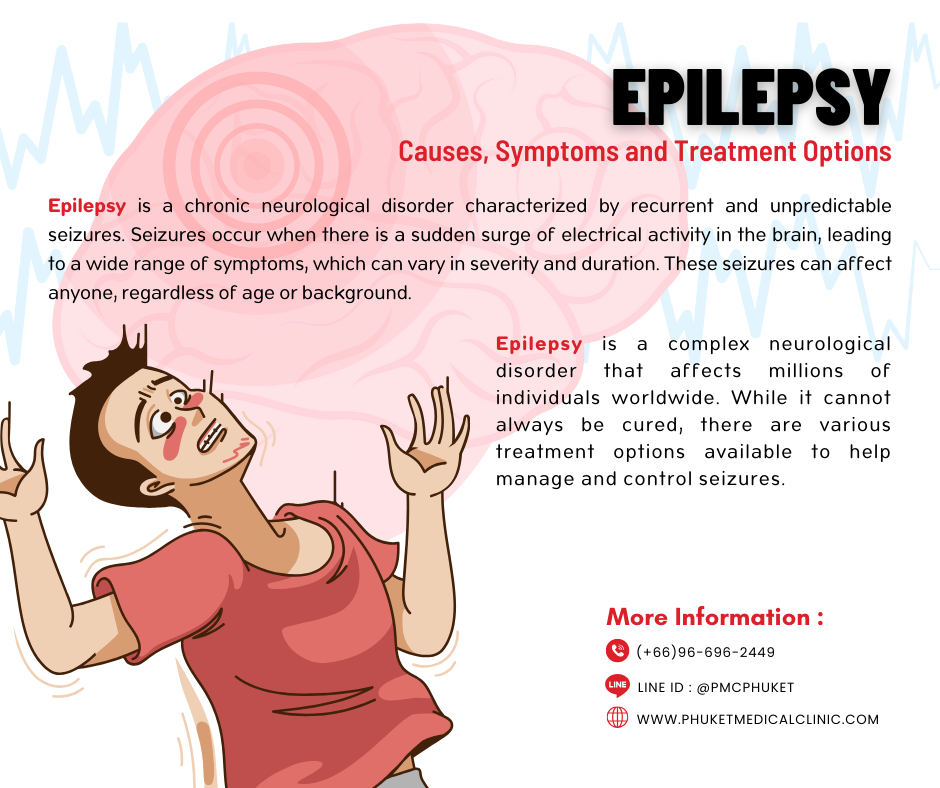Epilepsy is a neurological disorder that affects millions of people worldwide. While it can be a challenging condition to live with, understanding its causes, symptoms, and treatment options can help individuals and their loved ones manage the condition more effectively. In this article, we’ll delve into the various aspects of epilepsy, shedding light on what it is, its potential causes, common symptoms, and the available treatment options.
What is Epilepsy?
Epilepsy is a chronic neurological disorder characterized by recurrent and unpredictable seizures. Seizures occur when there is a sudden surge of electrical activity in the brain, leading to a wide range of symptoms, which can vary in severity and duration. These seizures can affect anyone, regardless of age or background.

Causes of Epilepsy
- Genetic Factors: Some individuals have a genetic predisposition to epilepsy, making it more likely for them to develop the condition.
- Brain Injuries: Head injuries, such as concussions or traumatic brain injuries, can increase the risk of epilepsy.
- Infections: Certain infections, like meningitis or encephalitis, can damage the brain and trigger seizures.
- Developmental Disorders: Conditions like autism or Down syndrome may be associated with a higher risk of epilepsy.
- Brain Tumors: The presence of brain tumors can lead to seizures, sometimes even after the tumor is removed.
Symptoms of Epilepsy
Epileptic seizures can manifest in various ways. Some of the most common symptoms include:
- Convulsions: Involuntary muscle spasms and jerking movements.
- Loss of Consciousness: Some individuals may become unresponsive during a seizure.
- Auras: Some people experience sensory disturbances, like strange odors or visual hallucinations, before a seizure.
- Confusion: Post-seizure confusion is common, with individuals often not remembering the seizure.
- Emotional Changes: Seizures can lead to mood swings, fear, or panic.
Treatment of Epilepsy
- Medications: Antiepileptic drugs (AEDs) are the most common form of treatment for epilepsy. These medications help control seizures and are often the first line of defense.
- Surgery: For individuals whose seizures don’t respond to medications, surgical procedures may be considered to remove the area of the brain causing the seizures.
- Ketogenic Diet: Some individuals may benefit from a high-fat, low-carbohydrate ketogenic diet, which has been shown to reduce seizures in certain cases.
- Vagus Nerve Stimulation (VNS): A surgically implanted device that stimulates the vagus nerve can be an option for those who don’t respond to other treatments.
- Lifestyle Modifications: Avoiding triggers, getting enough sleep, and reducing stress can help manage epilepsy and prevent seizures.
Epilepsy is a complex neurological disorder that affects millions of individuals worldwide. While it cannot always be cured, there are various treatment options available to help manage and control seizures. It is crucial for individuals with epilepsy to work closely with healthcare professionals to develop a personalized treatment plan that best suits their needs. By raising awareness and understanding the condition, we can better support those living with epilepsy and improve their quality of life.
Epilepsy – Diagnosis and Treatment at Phuket Medical Clinic
Phuket Medical Clinic : Close, Expert Care. Dedicated Medical Professionals and Skilled Team providing Consultation and Treatment. Walk-in or Scheduled Appointments for Convenient and Efficient Services.
Book an appointment online : https://phuketmedicalclinic.youcanbook.me
Daily Open 🕙 10:00-18:00
Contact number ☎️ 096-696-2449
Line id : @pmcphuket or https://lin.ee/R1TKRDo
Map 📌https://goo.gl/maps/xu45eTQUTjgpukJa7
Website 🌐https://phuketmedicalclinic.com
Feel free to consult with a doctor or ask further questions anytime.
Inbox : m.me/100483916443107
#healthcareclinic #คลินิกภูเก็ต
Phuket #Clinic #ภูเก็ตเมดิคอลคลินิก
#Phuketmedicalclinic
